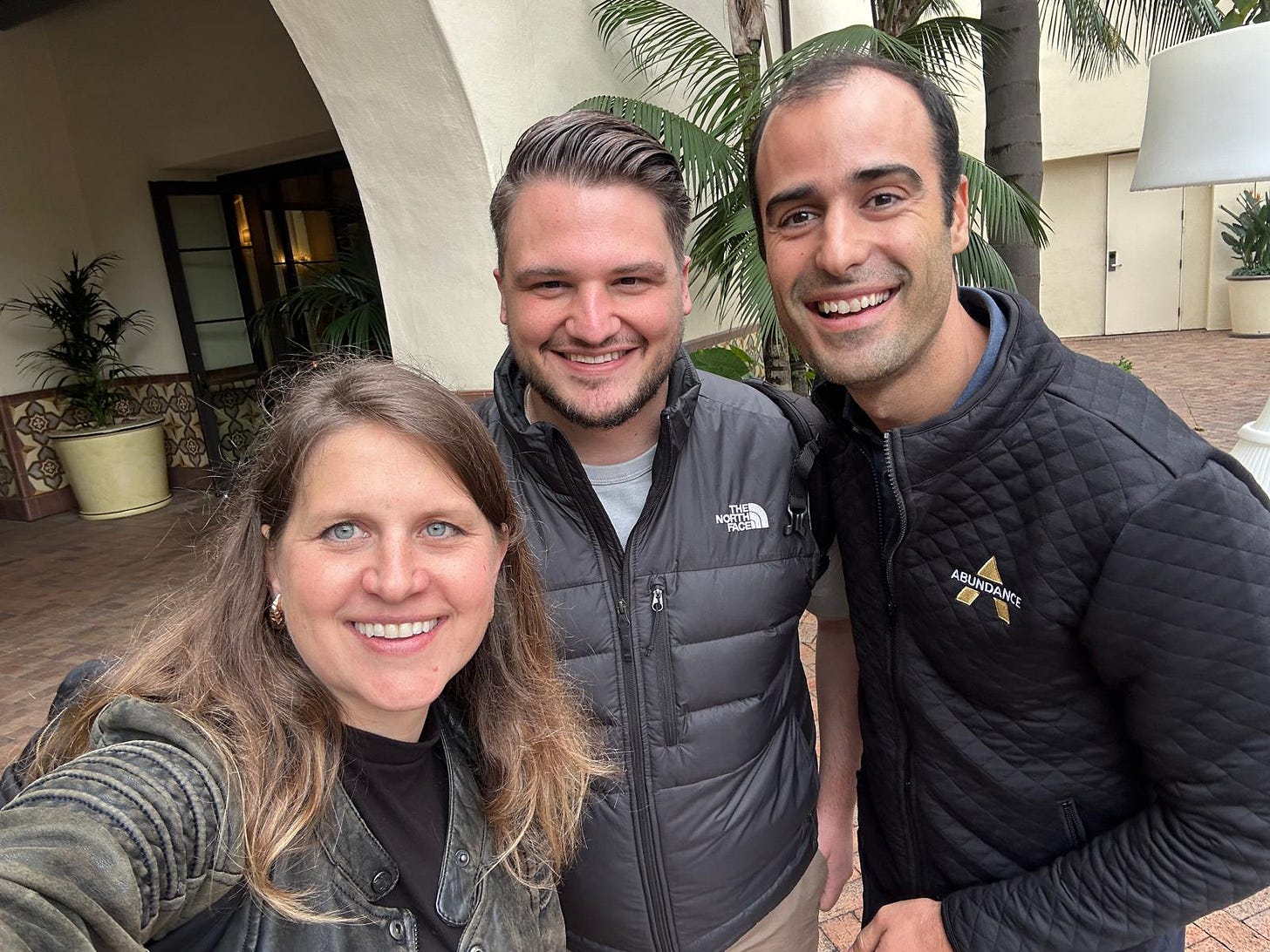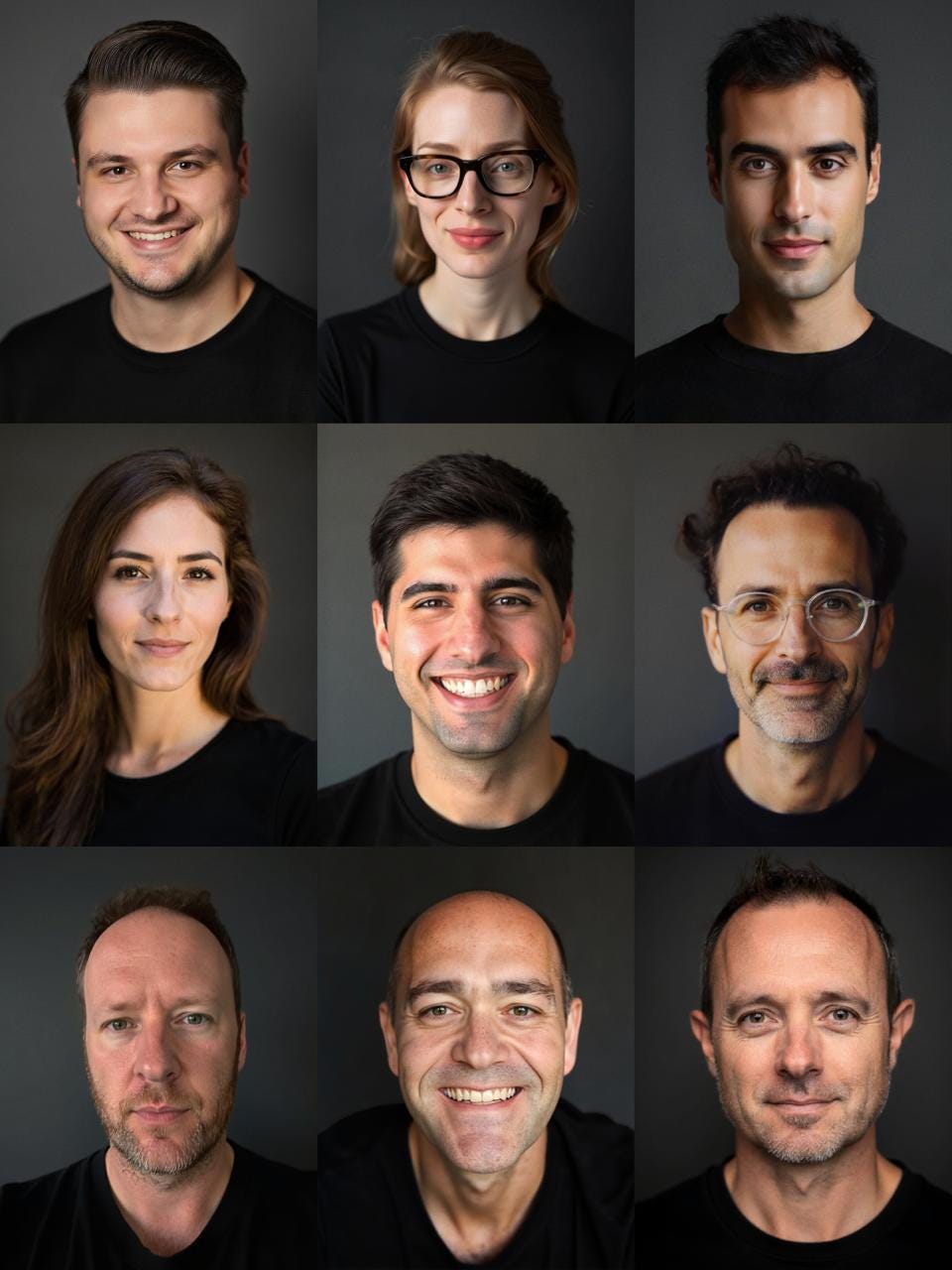Meet The Startup Trying To Build The Berkshire Hathaway For AI Services
Startup holding company Infinity Constellation has raised $17 million and launched 8 AI services startups that have already reached millions in revenue within months.

The Upshot
It’s become a meme for Silicon Valley tech leaders: when will a single person leverage AI to build a billion-dollar business on their own?
More than a year ago, OpenAI co-founder Sam Altman told investor Alexis Ohanian that he was part of a “little group chat” of fellow tech CEOs betting on the first year it would happen. Just last week, Dario Amodei, co-founder and CEO of rival AI frontier lab Anthropic doubled down. It will happen next year, in 2026, he said – later clarifying he gave it a 70% to 80% chance.
“It’s not that crazy,” Mike Krieger, Anthropic’s chief product officer who co-founded and sold Instagram to Facebook for $1 billion in 2012, replied.
Serial founder Brennan Pothetes doesn’t disagree much. He’s building a new kind of startup on a different premise: that a holdco, or holding company, that pools AI services know-how and backend resources can spin up and launch a bunch of lean startups.
In areas such as insurance, regulations, design and executive assistance, Infinity Constellation isn’t depending on solo founders to succeed – but it’s directionally close. “You don’t need a team of 500 people anymore, you need a team of five people, or 10,” Pothetes tells Upstarts.
Infinity Constellation is formally launching today with $17 million in investment and 8 subsidiary startups that have already reached a combined $7.1 million in annualized revenue. Investors include Freestyle, Backed VC, Deepwater and BY Venture Partners; it’s also backed, and spun out of, another tech company, Invisible Technologies, an AI training and services provider that has parlayed work with AI shops Cohere and OpenAI, as well as giants Amazon and Microsoft, into $130 million-plus in revenue.
Whereas Invisible’s approach of blending human services with technology is partly inspired by Palantir, the historically consulting-heavy software business that has seen its stock soar 485% over the past year, new venture Infinity draws inspiration from several older holdco standouts: hedge fund titan Citadel, and Warren Buffett’s legendary Berkshire Hathaway.
Invisible founder Francis Pedraza says it’s his personal answer to ‘The Innovator’s Dilemma’. Pothetes calls it a “wonky” structure that can ultimately unlock better outcomes for customers who just want AI to help their businesses.
They’ve already convinced a small band of founders and startup operators from their orbits to bet that Infinity is onto something big. Now they need to prove the ‘small team to $1 billion’ meme right. More on their approach below.
Presented by our Launch Partner, Brex.
Building a startup is hard. Managing your finances shouldn’t be. Brex gives you the speed, control, and scale to grow, without slowing you down.
✅ Same-hour access to high-yield banking
✅ Up to 20x higher card limits with bonus rewards
✅ Automated expense processing and invoicing
More than 30,000 companies—including 1 in 3 U.S. startups, such as Anthropic, Substack, Scale AI, and Robinhood—trust Brex to help them spend smarter and move faster. Run your startup on Brex → brex.com/upstarts
Dilemma Breaker
When Pedraza read the late Harvard Business School professor Clayton Christensen’s business class “The Innovator’s Dilemma” in 2022, it hit close to home. His startup, Invisible, had been close to shuttering two years before; now it was signing large contracts with the likes of DoorDash and OpenAI, as reported in a Forbes profile in February. (Asked whether those two businesses are current customers, Pothetes and Pedraza declined to comment.)
The small- and medium-sized businesses (SMBs) that had been Invisible’s staple customer were now less of a priority compared to $1 million or even $10 million per year contracts. “We were in a strange position where what we had was working, but I was saying no to many of the people who needed Invisible the most,” Pedraza says.
The only path forward that didn’t lead to Invisible’s eventual (in a timescale of decades) obsolescence that he could see: create a holding company in the manner of Berkshire Hathaway, which allowed subsidiaries like car insurance business GEICO to flourish, or Citadel, where billionaire Ken Griffin used in-house technology and resources to stake budding hedge fund managers and then keep them in the fold.
To do it, Pedraza bought back shares of Invisible from early venture capital investors to consolidate control, as detailed in the Forbes story, then quietly invested $5 million of Invisible’s resources into building Infinity with internal executives and teams who could tackle new lines of business within Invisible’s broad thesis of providing services and operations enabled by AI.
Infinity’s next phase began when Pothetes, a former startup product leader, sold the startup he was leading as co-founder and CEO, Butter Insurance, to operations startup Odeko last year. Pedraza knew Butter as an early Invisible customer; meeting with Pothetes, he tapped the entrepreneur to run Infinity as a standalone business.
Infinity spun out with several of the ideas incubated within Invisible, including Supernal, an SMB-focused operations-as-a-service provider like Infinity originally was; and Everest, a service helping executive assistants to leverage AI. Invisible owns just under half of the company, which shares a board director with Meta through investor Charlie Songhurst.
Infinity’s playbook: tap founders who are experts within a certain domain to build an AI services business in their area, sharing back-end software and operations with the rest of Infinity’s portfolio and getting a boost from exposure to its customer base and founder peers.
Each Infinity business will have its own niche, but a common goal of bringing AI capabilities into businesses that might not have tech teams, or don’t have the time to customize their own stack using the latest tools from Anthropic, OpenAI or other AI software providers.
“If you come to people and say, ‘Here’s a product for you. It’s going to be higher quality than you’ve been able to afford before. All you have to do is pay me, and I’ll guarantee you this service,’ people are really happy to do that,” says Pothetes.
Infinity’s eight launch companies include Supernal and Everest, as well as Zero Hiring, which offers outsourced recruiting; Labrynth, which works in regulatory approvals; Unlimited, providing back-office financial service automation; Radiance, a design agency; Ascendancy, in business development and executive recruiting; and Lightning, an educational platform.

With their combined revenue already at a $7 million-plus run rate, Pedraza expects Infinity to approach $15 million in annualized sales by the end of 2025. The goal is for Infinity to launch four to eight new startups each year.
Baking the cake
Core to Infinity’s thesis – and its chances of raising a larger Series A, and eventually going public, in the future – is its founders’ belief that AI services will continue to explode as a category, with startups able to take advantage.
It will face considerable competition. At startup accelerator Y Combinator, 80% of its March batch of startups were building in AI. Vertically-focused AI applications are a popular and obvious area of venture capitalist interest across a number of firms; last month, one major OpenAI backer, Thrive Capital, was reported by The New York Times to be raising $1 billion for its own holdco to both develop and acquire AI startups. Then there are numerous residencies and programs for AI founders: Upstarts recently wrote about nine startups launching out of one, Betaworks’ AI Camp.
While many of these startups are focused on building tech tooling more than services, Palantir’s success with ‘forward deployed engineers’ who can build custom-coded solutions for a client, then apply its learnings to other customers, has caught the eye of the wider ecosystem, too. Last week, Upstarts wrote about the race among startups Decagon, Sierra and others to build customer support agents; Sierra’s approach leans heavily on forward-deployed services to pursue big businesses.
Infinity’s founders believe that the company’s experience with Invisible and an outcomes-focused business model will provide ample room for its startups to grow. “Our main right to win is Invisible. It gives me a 12 to 18 months’ headstart,” says Pothetes.
Adds Pedraza: “If you want a cake, Silicon Valley will not sell you a cake. Silicon Valley will only sell you tools to make your own cake.”
From an investor standpoint, Infinity’s moat is unlikely to be the code of its subsidiary startups on its own, says Freestyle general partner Maria Palma, who led its round. It’s the combination of a shared back-end, flexibility not to have to fundraise immediately, and friendly rivalry and support between its leaders.
“They don’t have to deal with all the other bullshit, they can just build,” Palma says. “It’s very much ‘we’re building and helping each other, but also seeing if we can get revenue faster than you.’”
One major question for Infinity: whether it can attract a steady stream of quality entrepreneurs. At least half of its eight initial startups have close ties to either Invisible or Pothetes so far. He’ll have to convince new ones that Infinity’s model – its backers say founders can end up with more ownership at exit through its approach, despite a lower starting point – can make sense for the most ambitious. Lone-wolf founders who want to “be out in the world fighting dragons” may not see the benefit, Pothetes admits.
The pitch worked on his former Butter co-founder, Jenn Sammarco, now leading startup Everest. Unlike an incubator or venture studio where founders might be working on different fields, or at different stages of development, Everest can benefit from peer businesses pursuing similar goals at the same time, she says. “It creates the room for you to relentlessly focus,” she argues.
Stuart Lacey, the CEO of Labrynth in regulatory approvals, tells Upstarts that after building a dozen businesses, he wouldn’t have started a new one without Infinity. He left Invisible’s annual meeting last November in Lake Placid inspired by the model’s better incentives for customers, he says; above all, he was impressed by Pedraza, now the executive chairman of both Invisible, which he plans to take public, and Infinity.
“I came home to my wife and said, I want your support on it, but I think I’m going to spend the next decade of my life building a company with Francis and Invisible,” Lacey says.




This is a very curious model. I like the idea that many of these companies will be either closely related or hopefully easier to cross-integrate within a single tech stack.
I also wonder if what they are building could lead to a portfolio of tools that are supported by a single SG&A group where all the “boring” operational items like Finance, Accounting, RevOps and could be even Sales are covered by a unified team they all have access to.